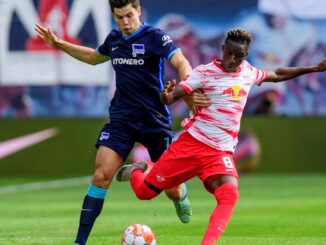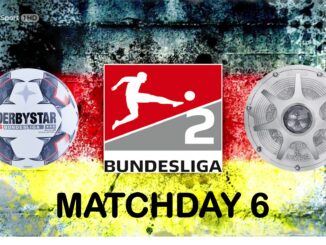
Hertha BSC 5-4 Holstein Kiel, – Rheinstadion, 22 July 1930
This week’s edition of German Football’s Greatest Games will go back to not just the pre-Bundesliga era, but the pre-WW2 era. German football was very different then, not least because Germany was very different. The 1930 national championships featured teams like Beuthen, Stettin and Breslau (if those names aren’t familiar, consult a map of Poland). But it would be wrong to ignore over half a century’s worth of football just because there might be a bit more explaining to do.
In those days, without a national league, the German title was decided by a knockout tournament, contested by the winners and runners-up of regional competitions. The title would be decided with a one-off game at a neutral venue. In 1930, that game would be played in Düsseldorf, between Hertha BSC and Holstein Kiel.
Building Hertha BSC
The story starts with a club named BFC Hertha. They had been champions of Berlin four times, but only once took part in the national championship finals. In 1923, strapped for cash and looking for a stadium, they turned to Berliner Sport-Club, a much richer but much less successful club. Together, they formed Hertha BSC, and built a new stadium together in the Wedding district of Berlin – the city’s best sports stadium, and the only one designed for football.
The new Hertha would grow into a top-class side, but they did not instantly find success. In their first season, Hertha BSC were beaten to 1st place in their division of the Berlin & Brandenburg league by Alemannia Berlin-Nord. Crucially, Hertha then signed Alemannia’s main man, German international Hanne Sobek. He would come to be known not only as Hertha’s biggest hero, but also the greatest player Berlin ever had. Sobek is still celebrated to this day, and with good cause. In glamorous 1920’s Berlin, Sobek was the standout sports star, and also became a film star in 1927 – he appeared in the silent film ‘Die elf Teufel.

The eternal runners-up
Pairing Sobek with other national team players Karl Tewes and Hans Ruch, Hertha BSC became a major force in German football. In 1926, the Berliners made a name for themselves in the national championship, demolishing the previous year’s finalists FSV Frankfurt 8-2 and beating Hamburger SV 4-2 in the semi-final. Unfortunately, in the deciding game they were comfortably beaten by SpVgg Fürth, losing 4-1 despite taking an early lead.
1927 saw Hertha reach their second consecutive final. The game was even held in Berlin’s Deutsches Stadion, on the site that would soon become the Olympiastadion, and Hertha had beaten champions Fürth to get there. But again Hertha lost, this time to 1. FC Nürnberg. The next two years were more of the same – the club lost the 1928 final to Hamburg, and the 1929 final to Fürth – both teams Hertha were capable of beating, just not in a national final.
Finally, in 1930 Hertha reached the final for the fifth time in a row, where they would meet Holstein Kiel. Hertha had knocked die Störche out in both of the previous two campaigns, but unlike the Berliners, Kiel had been champions before, back in 1912. Their squad had 8 national team players, and they also had a professional coach, Karl Heimlein, who’d coached in the Austrian and Spanish leagues.
Breaking the curse
Any Hertha fans who’d made the trip to Düsseldorf would have been forgiven for thinking it’d be a fifth defeat in a row, as Kiel raced into an early 2-0 lead. Werner Widmayer, the man who’d opened the scoring, then missed a great chance to put Kiel three goals ahead, and it was on that moment that the game turned. Soon afterwards, Hanne Sobek pulled two quick goals back for Hertha and brought his side level. Both sides would score once more before the break, going in at half time with the score 3-3.
In the second half, Hertha’s Bruno Lehmann got his second goal of the game, and Hertha were in front. It was the first time they’d led in a German championship final since the early stages of the 1926 loss to Fürth. Kiel fought back. Their forward Hannes Ludwig was controversially sent off for what the referee perceived to be dissent, which upset the crowd in Düsseldorf. With the formerly neutral spectators now behind them, Kiel grabbed a late equaliser through Oskar Ritter – 4-4.
With the threat of extra time closing in, Hertha had one more trick. Three minutes from time, Hans Ruch fired a hopeful shot from distance which beat Kiel’s keeper Alfred Kramer and won the title for the Berliners. At the fifth attempt, Hertha BSC had finally done it – and the Viktoria trophy would be heading to Berlin for the first time in almost twenty years, earning the players a hero’s welcome the next day from jubilant fans chanting, “Ha Ho He, Hertha BSC!”. The thrilling 5-4 win was seen as probably the best German championship final yet, and was the joint highest-scoring too. Despite losing, the Kiel players posed together with their opponents to commemorate the final.

A year later, Hertha would be back in the final for a sixth time. Now independent from Berliner SC, the team had a new crest, featuring a blue and white flag for the first time. Otherwise, the team was much the same. Sobek again scored two, and it was again decided late as the Berliners beat 1860 Munich, 3-2.
That remains the last time that Hertha, or any Berlin team, won the title.
Hertha BSC – Gehlhaar, Völker, Wilhelm, Leuschner, Müller, Radecke, Sobek, Hahn, Kirsei, Lehmann, Ruch – Coaches: Girulatis, Schuldt
Goals: Sobek (22, 26), Lehmann (36, 68), Ruch (87)
Holstein Kiel – Kramer, Lagerquist, Ohm, Zimmermann, Baasch, Lübke, Widmayer, Esser, Ludwig, Ritter, Voss – Coach: Heinlein
Goals: Widmayer (4), Ritter (8, 82), Ludwig (29)
This article is part of a new series on Bundesliga Fanatic entitled German Football’s Greatest Games. Celebrating 120 years since the first ever German football championship and 60 years since the first Bundesliga season, we’ll be going back through the country’s footballing history and writing about some of the most important and most memorable games Germany has ever seen.
Click the tag ‘German Football’s Greatest Games’ to see all the entries in the series.



